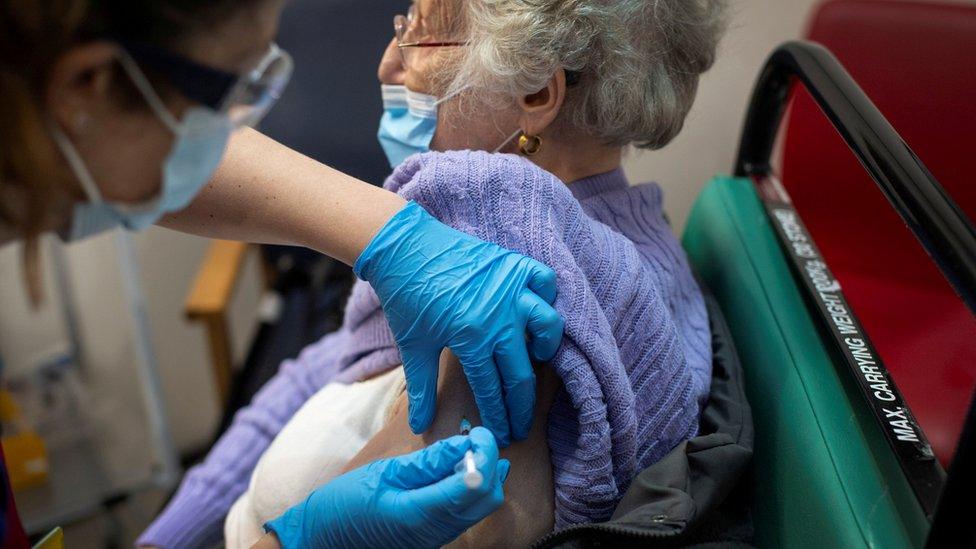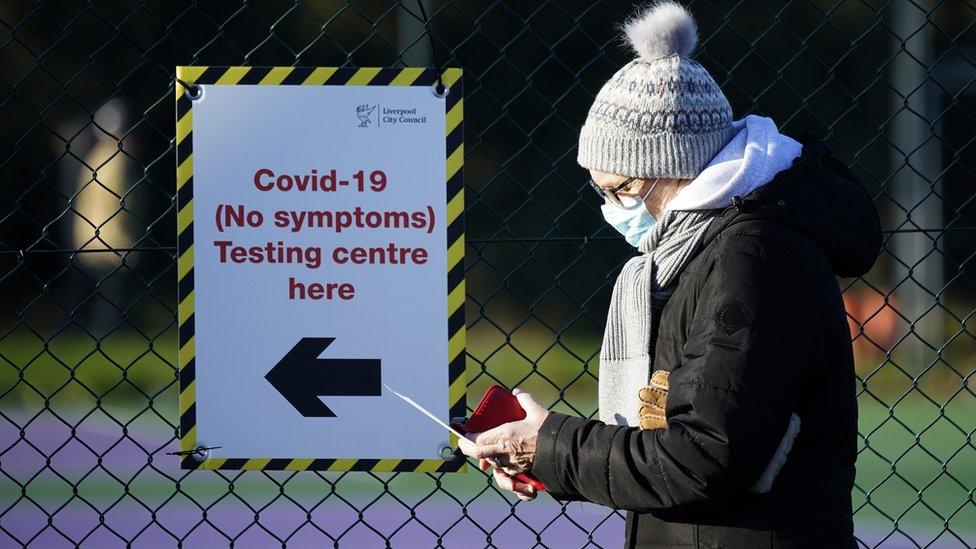Johnson: 24-7 Covid-vaccine hubs as soon as supply allows
- Published
- comments

Covid vaccinations will be offered 24 hours a day, seven days a week as soon as supply allows, Boris Johnson says.
The prime minister said the plan was to extend opening hours of vaccination centres - at the moment, most sites run from 08:00 to 22:00.
The 24-7 service will be piloted in a small number of places first - with NHS staff likely to be offered the option of overnight vaccinations first.
But Mr Johnson said supply was the limiting factor at the moment.
The NHS had just over a million doses available last week and used up most of them.
This week, there are thought to be more but not yet enough to vaccinate two million people - the weekly target the government is aiming to reach in the coming weeks.
At Prime Minister's Questions, Mr Johnson said there would be 24-7 vaccination "as soon as possible".
The UK has access to two vaccines at the moment - the Pfizer-BioNTech jab and another produced in partnership by Oxford University and AstraZeneca.
A third vaccine made by the US company Moderna has been approved but is not yet available to the UK.
'Exceptionally fast'
Mr Johnson praised the work of the more than 200 hospitals and 1,000 GP-led NHS vaccination sites running at the moment.
"They are going exceptionally fast," he added.

By the end of Monday, 2.4 million people had received their first vaccine dose.
The government has promised all the over-70s, the extremely clinically vulnerable and front-line health and care workers - about 15 million people - will be offered a jab by mid February.

How big a problem is supply?

There is actually enough vaccine in the country to vaccinate all the highest at-risk groups.
The problem is that not all of it has been packaged into vials or passed through the final safety checks.
There should soon be two million doses available each week for the NHS to use.
But the key question once that is achieved is how quickly and by how much supply can increase from there.
To make full use of the network of vaccination centres - the ambition is to have 2,700 up and running - many millions of doses will be needed each week.
There is huge global demand for these vaccines.
And while the Oxford-AstraZeneca jab is made in the UK, the Pfizer-BioNTech one is made abroad as is the Moderna vaccine.
Supplies of the latter are not expected until the spring.
This is an issue the government is likely to be grappling with for some time.
But despite the concerns, it should also be recognised the UK has been quick out of the blocks.
Only two countries have vaccinated a larger proportion of the population than the UK.

Labour leader Sir Keir Starmer said it was vital the government moved quickly.
Speaking about the planned 24-7 vaccination, he said: "I obviously welcome that and urge the prime minister and the government to get on with this."
Meanwhile, Nadhim Zahawi, the minister in charge of the vaccination programme, was also asked about supply, at an appearance before the Science and Technology Committee.
He said he had a "clear line of sight" for the expected numbers that would be available to the NHS for the next few months but refused to give any more detail.
"The more we show off about how many vaccine batches we're receiving, the more difficult life becomes for the manufacturers," he said.
AstraZeneca vice president Sir Mene Pangalos said one of the issues the firm was facing was that infections among staff had begun to hinder production.
"I feel that it is critical that those who are working on vaccines are immunised because if you have an outbreak at one of the centres, which we've had actually or in one of the groups in Oxford that's working on new variants, or those working on the regulatory files everything stops."

LOOK-UP TOOL: How many cases in your area?
YOUR QUESTIONS: We answer your queries
GLOBAL SPREAD: How many worldwide cases are there?
THE R NUMBER: What it means and why it matters
TEST AND TRACE: How does it work?

Related topics
- Published5 January 2021
